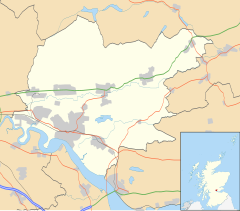Tullibody
Tullibody
|
|
|---|---|
 Residential area of Tullibody with the Ochils in the background |
|
| Tullibody shown within Clackmannanshire | |
| Area | 3.03 sq mi (7.8 km2) |
| Population | 8,345 (2008 est.) |
| • Density | 2,754/sq mi (1,063/km2) |
| OS grid reference | NS859951 |
| Council area | |
| Lieutenancy area | |
| Country | Scotland |
| Sovereign state | United Kingdom |
| Post town | ALLOA |
| Postcode district | FK10 |
| Dialling code | 01259 |
| Police | Scottish |
| Fire | Scottish |
| Ambulance | Scottish |
| EU Parliament | Scotland |
| UK Parliament | |
| Scottish Parliament | |
Tullibody (Scottish Gaelic: Tulach Bòide) is a town set in the Central Lowlands of Scotland. It lies north of the River Forth near to the foot of the Ochil Hills within the Forth Valley. The town is 1.8 miles (2.9 km) south-west of Alva, 1.8 miles (2.9 km) north-west of Alloa and 4.0 miles (6.4 km) east-northeast of Stirling. The town is part of the Clackmannanshire council area.
According to a 2009 estimate the population of Tullibody is approximately 8,300 residents including the area of Cambus.
Tullibody is a former mining town, although neither that industry nor any other major employers have a presence in the town, with many of the residents now commuting to Stirling and Alloa to work. Since the late 1990s and early 2000s, there has been a rapid expansion in housebuilding in the town, with 400 new houses built on the north side of the village in the last 5 years.
It is thought that St. Serf first set up a church on the site of its present Auld Kirk in the 5th century when Christianity was brought over from Ireland. Folklore states that Kenneth MacAlpin, King of Scots, amassed his army on Baingle Brae before he fought and subdued the Picts. Certainly there was a standing stone on the main road to Stirling (near the Catholic Church) until the early 1900s when it is then reported to have been demolished to make ready for the road upgrading.
David I of Scotland was responsible for Tullibody’s claim to fame when in 1149 he granted the lands and fishing rights to Cambuskenneth Abbey and it was then that the Auld Kirk was erected, where it still stands today. In January 1560, William Kirkcaldy of Grange demolished part of Tullibody bridge to delay French troops returning to Stirling Castle. The French commander Henri Cleutin took down the roof of the Auld Kirk to repair the bridge. Until the Scottish Reformation in 1560 the religion was Catholic but then became Protestant. Tullibody has been served well, being the Parish Church of the area until that time when it lost its celebrity status and Alloa took the title. The Abercrombys made The Auld Kirk their family vault.
...
Wikipedia

